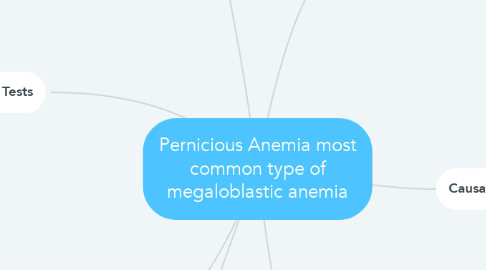Pernicious Anemia most common type of megaloblastic anemia
by Debbie Harper


1. Risk Factors
1.1. Family history
1.1.1. Northern European whites
1.2. Gastrectomy
1.2.1. Bariatric surgery
1.3. Autoimmune disorder involving the endocrine glands,
1.3.1. Addison's Disease
1.3.2. Type 1 Diabetes
1.3.3. Graves' Disease
1.3.4. Vitiligo
1.3.5. Thyroid Disease
1.4. Diseases or other disorders that may prevent your body from properly absorbing vitamin B12.
1.4.1. Crohn's Disease
1.4.2. Helicobacter Pylori,
1.4.3. HIV
1.5. Pregnancy
1.6. Diet
1.6.1. Strict vegetarian who doesn't eat any animal or dairy products and doesn't take a vitamin B12 supplement
1.7. Celiac disease
1.8. Medications and drugs that interfere with absorption or stability
1.8.1. Metrormin
1.8.2. Histamine receptor antagonists
1.8.3. Proton pump inhibitors
1.8.4. Nitrous oxide
1.9. Tape Worm
1.10. Increased Age
2. Diagnostic Tests
2.1. Blood Tests
2.2. Gastric Biopsy
2.3. Clinical Manifestations
2.4. Bone Marrow Aspiration
2.5. Methylmalonic Acid and Hormocysteine levels
3. Common Findings
3.1. Fatigue and Weakness
3.2. Shortness of Breath
3.3. Pale or yellowish skin
3.4. Irregular Heartbeats
3.5. Unsteady Movements
3.6. Personality Changes
3.7. Numbness or Tingling in feet or hands
3.8. Weight Loss
3.9. Dizziness
3.10. Sore beefy red tongue
3.11. Hemoglobin level 7 to 8 g/dl
4. Pathophysiologic Factors
4.1. Infection
4.1.1. Helicobacter Pylori
4.2. Immunity
4.2.1. Autoimmune disorder involving the endocrine glands,
5. Pathophysiologic etiology
5.1. Absence of intrinsic factor, a transporter required for absorption of dietary vitamin B12, which is essential for nuclear maturation and DNA synthesis in erythrocytes. Intrinsic factor is secreted by gastric parietal cells and complexes with dietary vitamin B12, in the small intestine. B12 - intrinsic factor complex binds to cell surface receptors in the ileum and is transported across the intestinal mucosa
6. Causative Factors
6.1. Congenital intrinsic factor deficiency an autosomal recessive inheritance pattern
6.2. Autoimmune Polyendocrinopathy a cluster of autoimmune disease of endocrine organs
6.3. Autoimmune Gastritis
6.4. Environmental conditions
6.4.1. Alcohol
6.4.2. Hot Tea
6.4.3. Smoking
6.5. Medications
6.5.1. Proton pump inhibitors

